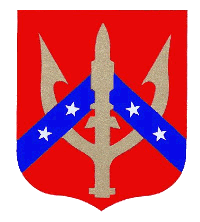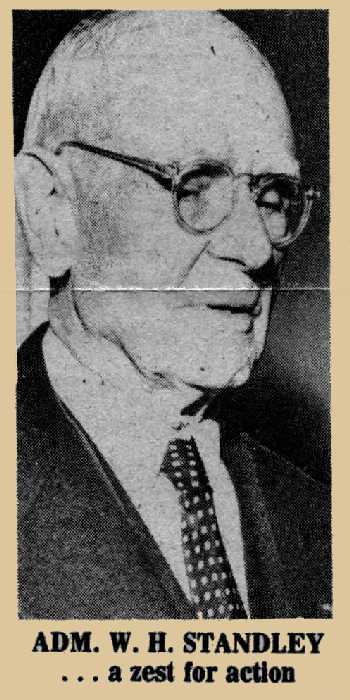USS William H. Standley (DLG/CG-32)
ADM. W. H. Standley
". . . a zest for action"




Sunday Morning, January 18, 1976
_______________________________________________________
ADM. STANDLEY
New School has Famed Namesake
By CARL RITTER
Staff Writer, The San Diego Union
Chances are that boys and girls destined to attend Standley Junior High School in University City when it opens to first classes in the fall never heard of Adm. William H. Standley, for whom the school is named.
The same probably applies to the majority of the students' mothers and fathers, privileged to utilize the facilities of newly opened Standley Park and Recreation Center just east of the school.
If so, the situation begs for correction.
From all accounts, Standley would have been a delight to have known. The young persons who will make most use of the center with its multipurpose athletic fields, tennis courts, swimming pool, basketball courts recreation building and the children who will attend the school named after Standley probably would have related well with him at almost any stage of his long and colorful life.
He was a rarity of humankind - one amoung us whose zest for action never leaves.
A scene at the Naval Hospital here not long before his death within a few weeks of his 91st birthday in 1963 typified well enough this extremely able man.
Entertains Hospital Corpsmen
"There he was, propped up in bed, with half a dozen young hospital corpsmen crowded around him," recalled his daughter, Vivian Standley Wincote of San Diego. "He was entertaining them. He was singing 'Red River Valley.'"
That same evening, she said, her father, the retired four-star admiral, had the young enlisted men chuckling over his tales of a rollicking boatswain's mate he professed to have known.
Born in Ukiah in 1872, the son of Doc Standley, a Mendocino County sheriff, the future admiral romanticized over a seafaring life as a boy and was admitted to the Naval Academy at Annapolis at the age of 19.
Little more than two decades later, as a captain, he was to be named commandant in charge of the school.
Thousands of older generation adults - especially those with Navy ties - remember Standley well.
Among many important posts he was to occupy after being graduated from the academy in 1896 were those of chief of naval operations, U.S. ambassador to Russia, acting assistant secretary of the Navy and member of the presidential board of inquiry that investigated the events leading up to the Japanese attack on Pearl Harbor.
He was the first native Californian to attain full admiral's rank and the first admiral to select San Diego as his home port.
Keen Student of Tactics
A keen student of naval power and tactics, he held "the grand strategy" viewpoint, as opposed to tacticians who favored single naval units.
He knew many world figures intimately, including Premier Josef Stalin and President Franklin Delano Roosevelt.
Standley was a man of medium height, erect and brisk of manner, softspoken yet direct in his conversational approach, blue-eyed and athletic. He was third baseman and captain of the Naval Academy baseball team and a golfer who shot his age when he was in his eighties.
In later life, on of his favorite pastimes was watching his grandsons play Little League baseball.

Standley was outspoken in his beliefs.
After a German U-boat sank an American ship in the summer of 1941 before the United States was a participant in World War II, he said:
"I believe in an immediate declaration of war before it is too damned late."
Much of his strength of character was brought out in a book, "Admiral Ambassador to Russia," written in collaboration with another retired admiral, Arthur A. Ageton. Standley had kept a day-by-day diary.
While ambassador to Russia in 1942 and 1943, he developed a kind of slow burn when month after month passed without the Russian leaders admitting to their people that the Red Cross and others in America and Great Britain were providing the Soviets with huge material help.
Finally, at a press conference with Quentin Reynolds and other American newsmen in Moscow, Standley delared:
"The Russian authorities seem to want to cover up the fact that they are receiving outside help. Apparently they want their people, to believe that the Red Army is fighting this war alone."
The newsmen excitedly asked if his remarks - diplomatic indiscretion, one could say - were off the record.
"No, use it" Standley replied. He added that it wasn't fair to the American people that ordinary Russians were not made aware of the millions of dollars in goods the Americans were offering because of people-to-people friendship.
The press reports shook up the Russian hierarchy.
Commissar Vyacheslav Molotov was to object strenuously.
Standley's ability to size up a situation was reflected in his response to FDR when asked whether he thought Stalin would make a separate peace with Hitler after it became evident the Allies had Germany on the ropes.
"No, sir. Positively not. The Red Army will push right on across the German border to Berlin, just as fast as it can get there.
"Stalin will insist the Soviet Union has a priority of interest in the Balkans and other Eastern European nations. I believe Stalin will try to set up buffer states along the Russian border which he can control, to help promote the security of the Soviet Union."
Looking further down the road, in the book's concluding chapter, Standley had this to say:
"We owe our position of leadership in the world today (in 1955) not so much to our military might and economic power as to the unusual kind of idealism we have presented to the world. But we must be vigilant . . ."
It might be said the Standleys tend to be a sturdy clan all down the line.
As an example, just the other day at the age of 94 the late admiral's sister, Jessie Standley Hildreth, protested vigorously because other family members opposed her plan for starting on a trip around the world. He idea was to go it alone.
The admiral's only son, Bill Jr., Laguna Hills, was one of the key planners for the invasion of Anzio Beach in World War II. He retired as a rear admiral, his sister Vivian said.
And the admiral's grandson Standley B. Wincote's insistence on serving with the military in time of war enabled him to overcome one eye's lack of sight to become a gunner's mate.
So the school, the recreation center, the 7,900-ton guided missile frigate and the redwood tree park near Ukiah that all bear the Standley name - in honor - appear well endowed.
Source: The San Diego Union
Courtesy Sara Standley

![[ Send Email to Gunner Mitchell ]](bnemail.jpg)
![[ Return to Home Page ]](bnhome.jpg)
![[ Return to WHS Facts Index ]](bnfacts.jpg)








![[ Send Email to Gunner Mitchell ]](bnemail.jpg)
![[ Return to Home Page ]](bnhome.jpg)
![[ Return to WHS Facts Index ]](bnfacts.jpg)